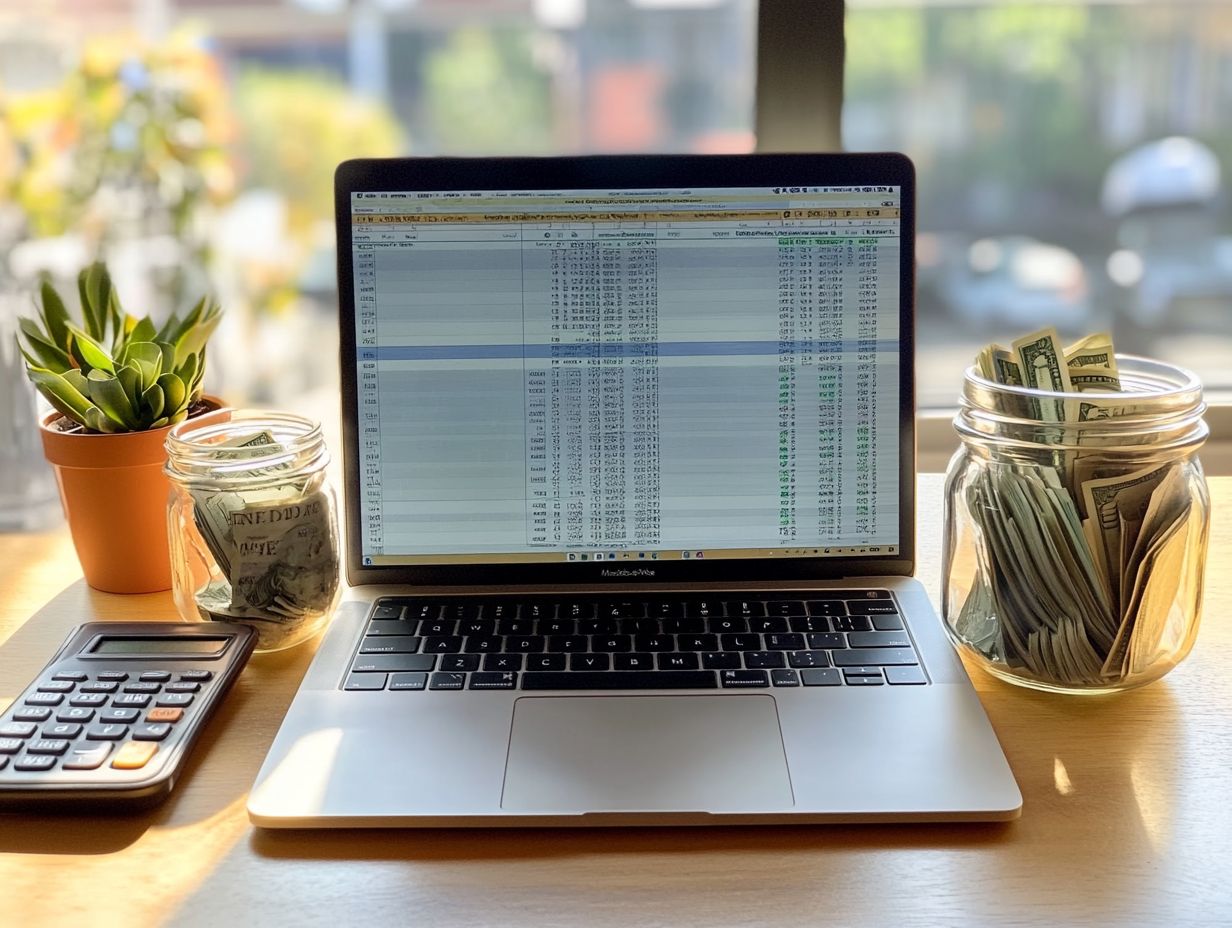How to Separate Personal and Business Finances as a Freelancer
Separating personal and business finances is crucial for freelancers. This practice helps them understand the differences between the two and emphasizes the importance of maintaining this separation. Let’s dive in and make your finances work for you!
By doing so, freelancers can reduce their overall tax burden, simplify bookkeeping, and manage their cash flow more effectively.
This article outlines the steps to establish separate bank accounts, track expenses, and avoid co-mingling funds, along with tools that can assist in managing these aspects efficiently.
Contents
- Key Takeaways:
- Understanding Personal and Business Finances
- Benefits of Separating Personal and Business Finances
- Steps to Separating Personal and Business Finances
- Tips for Maintaining Separation
- Resources for Freelancers
- Frequently Asked Questions
- How do I separate my personal and business finances as a freelancer?
- Why is it important to separate personal and business finances as a freelancer?
- How can I track my business expenses and income?
- Do I need to have a separate business bank account?
- Should I use a separate credit card for business expenses?
- What are some other tips for separating personal and business finances as a freelancer?
Key Takeaways:

- Understanding the differences between personal and business finances is crucial for freelancers to effectively manage their money.
- Separating personal and business finances can lead to benefits such as lower tax burden and simplified bookkeeping.
- Setting up separate bank accounts and credit cards, creating a budget, and tracking expenses are important steps in separating finances as a freelancer.
Understanding Personal and Business Finances
Freelancers need to grasp both personal and business finances to effectively manage their freelance careers and prepare for income fluctuations.
By separating personal finances from business finances, they can simplify budgeting and enhance their financial clarity.
This practice ensures that you set aside enough money for tax responsibilities, including the tax you pay on income earned from freelance work, health insurance, and retirement contributions.
Differences and Importance of Separation
The primary differences between personal and business finances for freelancers lie in their purpose and management techniques, both of which are crucial for effective financial planning.
These distinctions become even more significant when considering tax obligations and deductions. By keeping personal and business accounts separate, freelancers can more easily meet their money responsibilities, as this practice simplifies the tracking of deductible expenses.
It also facilitates the use of accounting software, which is software used to keep track of your finances easily, to monitor business transactions, providing a clearer overall view of their financial situation.
Consequently, separate accounts streamline tax preparation and enable freelancers to manage their finances more effectively, allowing them to focus on growing their business while ensuring compliance with their money responsibilities.
Benefits of Separating Personal and Business Finances
Separating personal and business finances provides numerous advantages for freelancers, such as reduced tax liability and simplified bookkeeping, both of which are essential for long-term financial health.
Reducing Tax Burden and Simplifying Bookkeeping
One of the key benefits of separating personal and business finances is the ability to reduce tax liability, enabling freelancers to maximize deductions for business expenses.
Comprehensive bookkeeping practices, supported by accounting software, can help freelancers efficiently document their business-related costs.
This software typically offers features for storing receipts and invoices, as well as automatically categorizing expenses, which aids in maintaining accurate records.
Effectively utilizing these tools can significantly simplify expense tracking throughout the year, providing a solid foundation for tax filing. Detailed records make it easier to determine tax liability, preventing last-minute calculations during tax season and ensuring that all deductions are fully accounted for.
Steps to Separating Personal and Business Finances
Freelancers can effectively separate their personal and business finances by taking essential steps such as opening a dedicated bank account and obtaining a separate credit card.
These steps help freelancers manage their careers better.
Setting Up Separate Bank Accounts and Credit Cards
Freelancers can better manage their business expenses by setting up a dedicated business account and obtaining a business credit card. This separation limits personal spending and enhances budgeting.
By separating personal and business finances, freelancers gain a clearer perspective on their cash flow, which can lead to more well-considered choices. A business credit card is particularly beneficial as it helps manage cash flow during lean periods and provides a consolidated record of business-related transactions.
This record not only aids in tax preparation but also assists freelancers in building a credit history that is essential for future growth opportunities.
Creating a Budget and Tracking Expenses
Creating a detailed budget and carefully tracking income and expenses are essential for freelancers seeking financial stability and the formation of an emergency fund.
Utilizing budgeting techniques and accounting software allows freelancers to gain a clearer understanding of their financial situation. This helps identify spending habits and areas for improvement.
This insight enables freelancers to adjust their budgets in response to income fluctuations that come with freelancing. Setting aside a percentage of income for an emergency fund creates a financial buffer that safeguards against low-income periods. This ensures that financial emergencies do not disrupt overall well-being.
Tips for Maintaining Separation
Maintaining a clear distinction between personal and business finances requires disciplined practices. Avoiding the co-mingling of funds is essential for simplifying cash flow management and tax preparation.
Avoiding Co-mingling of Funds
Freelancers should avoid co-mingling funds, as it can obscure the distinction between personal and business expenses. This can hinder the ability to accurately track income sources.
Implementing an accounting system that separates personal and business transactions provides a clearer view of income, expenses, and cash flow. This facilitates better budgeting and planning.
With a clear separation of finances, freelancers can easily monitor their earnings and expenditures, which is particularly beneficial during tax preparation periods. Poor financial separation often becomes evident during tax season, as improperly recorded business expenses can lead to audits and potential fines from tax authorities.
Frequent co-mingling of funds can undermine the reliability of financial records, making it difficult to make informed decisions about cash flow and sustainability. Adopting a disciplined approach to finances can enhance the business environment and foster growth.
Managing Cash Flow and Saving for Taxes
Proper cash flow management is crucial for freelancers. It ensures they save for taxes and meet obligations on time, preventing financial stress.
Implementing appropriate budgeting and forecasting practices helps freelancers understand their income streams and expected expenses. This leads to improved planning and financial security throughout their full-time freelancing endeavors.
Accounting software can be highly beneficial, allowing for real-time tracking of cash flow. These tools help freelancers maintain a clear and updated view of their financial situation. They also ensure that sufficient funds are set aside for tax obligations, minimizing the risk of unexpected liabilities at tax time.
Consequently, freelancers are better positioned to grow their businesses sustainably while responsibly fulfilling their financial commitments.
Resources for Freelancers
Freelancers have access to a wealth of resources that can significantly enhance their financial management, including a variety of tools and services for budgeting and accounting.
Explore these resources today to elevate your financial management skills! Don’t wait—your financial growth starts now!
Tools and Services for Managing Finances
Freelancers use various tools and services for effective financial management. These include accounting software, budgeting apps, and help from financial experts.
Popular accounting software options such as QuickBooks, FreshBooks, and Wave feature user-friendly interfaces. They assist with invoicing, expense tracking, and generating essential financial reports.
Budgeting tools like YNAB (You Need a Budget) and Mint help freelancers allocate their funds more effectively. Consulting a financial professional can be crucial for navigating complex tax obligations.
This guidance ensures freelancers stay compliant with regulations while maximizing their earnings potential. Start managing your finances today and watch your earnings grow!
Frequently Asked Questions
How do I separate my personal and business finances as a freelancer?
Open a separate bank account for your business expenses and income. This keeps your finances organized and makes tracking profits and expenses easier.
Why is it important to separate personal and business finances as a freelancer?
Separating your personal and business finances helps establish your business as a separate entity. It simplifies tracking expenses for taxes and protects your personal assets during legal issues.
How can I track my business expenses and income?
You can track your business expenses and income using various tools. Options include a simple spreadsheet, dedicated accounting software, or hiring a financial professional.
Do I need to have a separate business bank account?
While it’s not legally required, having a separate business bank account is highly recommended. It simplifies tracking your business finances and avoids confusion with personal finances.
Should I use a separate credit card for business expenses?
Using a separate business credit card is a smart move. It keeps your personal and business finances separate, making it easier to track expenses.
Plus, you might gain extra perks and rewards designed for business use!
What are some other tips for separating personal and business finances as a freelancer?
Besides having a separate bank account and credit card, establish a budget for your business expenses. Keep detailed records of your income and expenditures.
Talk to a financial expert or tax advisor for guidance. Consider setting up an emergency fund and contributing to a retirement plan.









